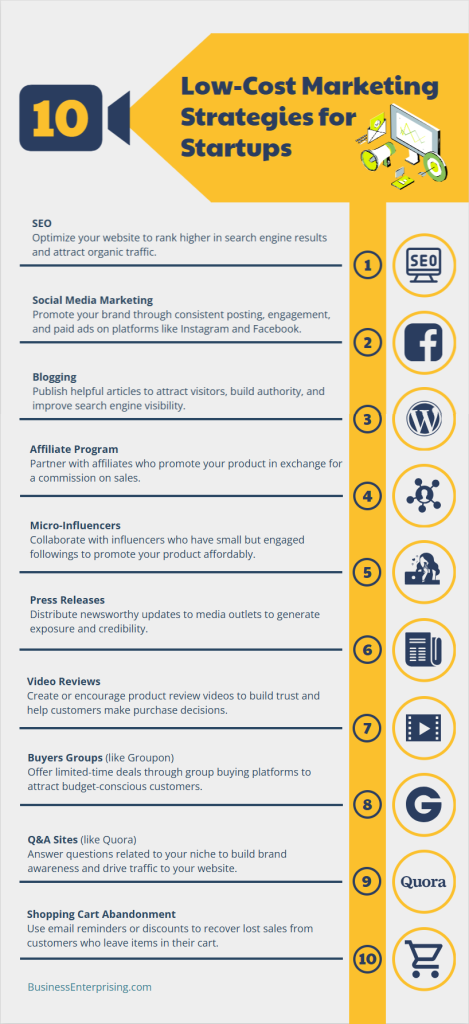
Understanding your target audience is the first step in developing a successful marketing plan. By identifying their needs and preferences, you can tailor your messaging to resonate effectively. Additionally, building a strong brand identity establishes credibility and fosters trust among potential customers. This foundation is essential for any marketing effort.
Digital marketing channels offer cost-effective avenues to reach a broader audience. Utilizing social media platforms, content marketing, and email campaigns can amplify your message without substantial financial investment. However, it’s crucial to monitor the performance of these channels. Analytics tools provide insights into what works and what doesn’t, allowing for timely adjustments.
Furthermore, embracing low-cost and guerrilla marketing tactics can generate buzz. Engaging with local communities or leveraging influencer partnerships can significantly boost visibility. These strategies, combined with continuous measurement and adaptation, form a comprehensive approach to marketing for startups. By remaining agile and responsive to feedback, your startup can navigate the complexities of the market and achieve sustained growth.
Defining Your Target Audience
Understanding your target audience is fundamental to developing effective marketing strategies for business startups. To identify and comprehend your ideal customers, consider employing market research, creating buyer personas, and conducting competitor analysis.
Begin by conducting thorough market research to gather data about potential customers. This process involves collecting information on demographics, preferences, and behaviors. Utilize surveys, interviews, and focus groups to gain insights into your audience’s needs and desires. Analyzing this data helps you understand who your customers are and what they seek.
Next, develop detailed buyer personas based on your research findings. A buyer persona is a fictional representation of your ideal customer, encompassing aspects like age, occupation, interests, and challenges. Crafting these personas allows you to empathize with your audience and tailor your marketing messages accordingly. For example, if your startup offers eco-friendly products, your buyer persona might be environmentally conscious individuals aged 25-40 who prioritize sustainable living.
Additionally, perform a comprehensive competitor analysis to see how other businesses engage with similar audiences. Examine their marketing tactics, product offerings, and customer feedback. This analysis reveals market gaps and opportunities for differentiation. By understanding what competitors do well and where they fall short, you can position your startup uniquely to attract your target audience.
Combining these approaches provides a holistic view of your ideal customers. Market research offers quantitative data, buyer personas humanize this information, and competitor analysis highlights positioning opportunities. Together, they form a robust foundation for crafting marketing strategies that resonate with your target audience, setting your startup on a path to success.
Building a Strong Brand Identity
Building a strong brand identity is essential for startups aiming to stand out in competitive markets. Consistent branding fosters recognition and trust among consumers. This consistency spans several key elements: logo design, brand messaging, tone of voice, and visual identity.
Your logo serves as the visual cornerstone of your brand. A well-designed logo should be simple, memorable, and reflective of your company’s values. For instance, the Nike swoosh embodies movement and speed, aligning with the brand’s athletic focus. Therefore, investing time in crafting a distinctive logo can significantly enhance brand recall.
Equally important is your brand messaging. This encompasses the core messages you wish to convey to your audience. Clear and consistent messaging ensures that customers understand your value proposition. Additionally, it differentiates you from competitors, making your offerings more appealing.
The tone of voice you adopt further humanizes your brand. Whether formal or casual, your tone should resonate with your target audience. Consistency in tone across all communication channels reinforces your brand’s personality. Consequently, it fosters a deeper connection with your customers.
Visual identity extends beyond the logo to include color schemes, typography, and imagery. These elements should harmonize to create a cohesive look and feel. For example, using a consistent color palette across all platforms enhances brand recognition. Moreover, it contributes to a unified brand experience.
Incorporating consistent branding elements is a fundamental aspect of marketing strategies for business startups. A strong brand identity not only attracts customers but also builds lasting relationships. By focusing on these components, your startup can establish a solid foundation for future growth.
Creating a Marketing Plan and Budget
Certainly! Here’s the revised version of your text with increased use of transition words for better flow and clarity:
Developing a strategic marketing plan and budget is essential for aligning your startup’s efforts with its business goals. Therefore, this process helps guarantee that every marketing activity contributes directly to your company’s growth and long-term sustainability.
To start, define clear and measurable marketing objectives that directly support your overall business aims. For instance, if increasing sales is a key goal, you might set specific targets such as boosting online sales by 20% within six months. As a result, these goals provide both direction and a reliable basis for evaluating success.
Next, identify your target audience by examining their demographics, preferences, and behaviors. Consequently, this insight allows you to develop marketing messages that resonate with potential customers, increasing both engagement and conversion rates.
In addition, conduct a thorough analysis of your competitors to uncover new market opportunities. By studying their strengths and weaknesses, you can identify gaps your startup is well-positioned to fill. Therefore, this positions your offerings more effectively in the marketplace.
With this information, select marketing channels that best reach your target audience. These may include social media, email campaigns, content marketing, or paid advertising. Ideally, choose channels that match both your audience’s preferences and your business objectives.
Moreover, budget allocation plays a critical role in your overall marketing strategy. Startups often allocate 10% to 20% of revenue to marketing, although this may vary depending on your industry and growth stage. Therefore, it’s wise to prioritize spending on channels that deliver the highest return. For example, if social media performs better than print ads, direct more funds toward that platform.
Leveraging Digital Marketing Channels
Leveraging digital marketing channels effectively is essential for startups aiming to establish a strong online presence and drive growth. By strategically utilizing channels such as SEO, content marketing, social media, email marketing, and PPC advertising, you can reach your target audience and achieve your business objectives.
Search Engine Optimization (SEO) enhances your website’s visibility on search engines like Google. By optimizing your site’s content and structure, you increase organic traffic from users searching for relevant keywords. This foundational aspect of marketing strategies for business startups ensures potential customers find your offerings when seeking solutions.
Content marketing involves creating valuable, relevant content to attract and engage your audience. This includes blog posts, videos, and infographics that address your customers’ needs and challenges. Consistently delivering high-quality content positions your startup as an industry authority, fostering trust and credibility.
Social media platforms like Facebook, Instagram, and LinkedIn offer avenues to connect directly with your audience. By sharing updates, promotions, and engaging content, you build brand awareness and foster community. Additionally, these platforms’ advertising options allow precise targeting based on demographics and interests.
Email marketing remains a cost-effective channel for nurturing leads and maintaining customer relationships. By sending personalized newsletters, product updates, and promotions, you keep your audience informed and engaged. Segmenting your email list ensures tailored messaging that resonates with different customer groups.
Pay-Per-Click (PPC) advertising enables immediate visibility by placing ads on search engines and social media platforms. You bid on keywords relevant to your business, and your ads appear to users searching for those terms. This method drives targeted traffic to your site, with costs incurred only when users click on your ads.
Utilizing Low-Cost and Guerrilla Marketing Tactics
Implementing low-cost and guerrilla marketing tactics can significantly boost your startup’s visibility without straining your budget. These creative strategies not only generate buzz but also foster community engagement, positioning your brand effectively in the market.
One effective approach involves forming partnerships with influencers. Collaborating with individuals who align with your brand values allows you to tap into their established audiences. This method enhances credibility and broadens your reach without substantial financial investment. For instance, some brands have gained popularity through organic promotion from loyal customers and celebrities, avoiding traditional advertising expenses.
Referral programs also offer a cost-effective way to expand your customer base. Encouraging satisfied customers to refer friends and family can lead to exponential growth. Offering incentives, such as discounts or freebies, motivates customers to share your products or services with others. This strategy leverages existing relationships to build trust and attract new clients.
Engaging with your local community can further amplify your brand’s presence. Participating in local events, sponsoring community activities, or collaborating with other small businesses fosters goodwill and increases brand visibility. These interactions create personal connections, making your brand more relatable and memorable.
Creative tactics like sidewalk chalk art can capture attention in high-traffic areas. This unconventional method draws curiosity and encourages passersby to engage with your brand. Similarly, distributing stickers or setting up pop-up shops in strategic locations can create buzz and attract potential customers.
Investing in content marketing is another budget-friendly strategy. Creating valuable, shareable content positions your brand as an industry authority. This approach not only educates your audience but also encourages organic sharing, extending your reach without significant costs.
Measuring Success and Adapting Strategies
Measuring success and adapting strategies are fundamental components of effective marketing strategies for business startups. By tracking key performance indicators (KPIs), utilizing analytics tools, and remaining flexible, you can enhance your marketing efforts.
Begin by identifying relevant KPIs that align with your business objectives. These metrics might include conversion rates, customer acquisition costs, or website traffic. Regularly monitoring these indicators provides insight into your marketing performance.
To effectively track these KPIs, employ analytics tools such as Google Analytics or Mixpanel. These platforms collect and interpret data, offering a clear view of your marketing effectiveness. Armed with this information, you can make informed decisions to optimize your strategies.
However, data collection alone isn’t sufficient. You must be prepared to adjust your strategies based on the insights gathered. For instance, if a particular campaign underperforms, analyze the data to identify the issue. Then, modify your approach accordingly. This adaptability ensures that your marketing efforts remain effective and aligned with your goals.
Additionally, consider adopting an agile approach to campaign management. This methodology involves regularly testing and refining your tactics based on performance data. By staying agile, you can quickly respond to market changes and customer feedback, thereby maximizing your marketing ROI.
Incorporating these practices into your marketing strategies fosters a culture of continuous improvement. By diligently tracking KPIs, leveraging analytics tools, and remaining flexible, your startup can navigate the dynamic business environment more effectively. This proactive approach not only enhances your current marketing efforts but also positions your business for sustained success.
Conclusion
In developing effective marketing strategies for business startups, it’s essential to integrate various approaches that align with your company’s objectives. By defining your target audience, building a strong brand identity, and creating a strategic marketing plan, you lay a solid foundation for success. Leveraging digital marketing channels such as SEO, content marketing, social media, email marketing, and PPC advertising further amplifies your reach. Additionally, utilizing low-cost and guerrilla marketing tactics can generate buzz without significant financial investment.
However, implementing these strategies is only part of the equation. Measuring success through key performance indicators (KPIs) and utilizing analytics tools is equally important. This data-driven approach allows you to assess the effectiveness of your marketing efforts. Furthermore, being flexible and willing to adapt your strategies based on performance and feedback ensures continuous improvement.
By combining these elements, your startup can navigate the competitive landscape more effectively. This comprehensive approach not only drives growth but also fosters a resilient and adaptable business model. Ultimately, the integration of thoughtful planning, diverse marketing tactics, and ongoing evaluation positions your startup for sustained success.



